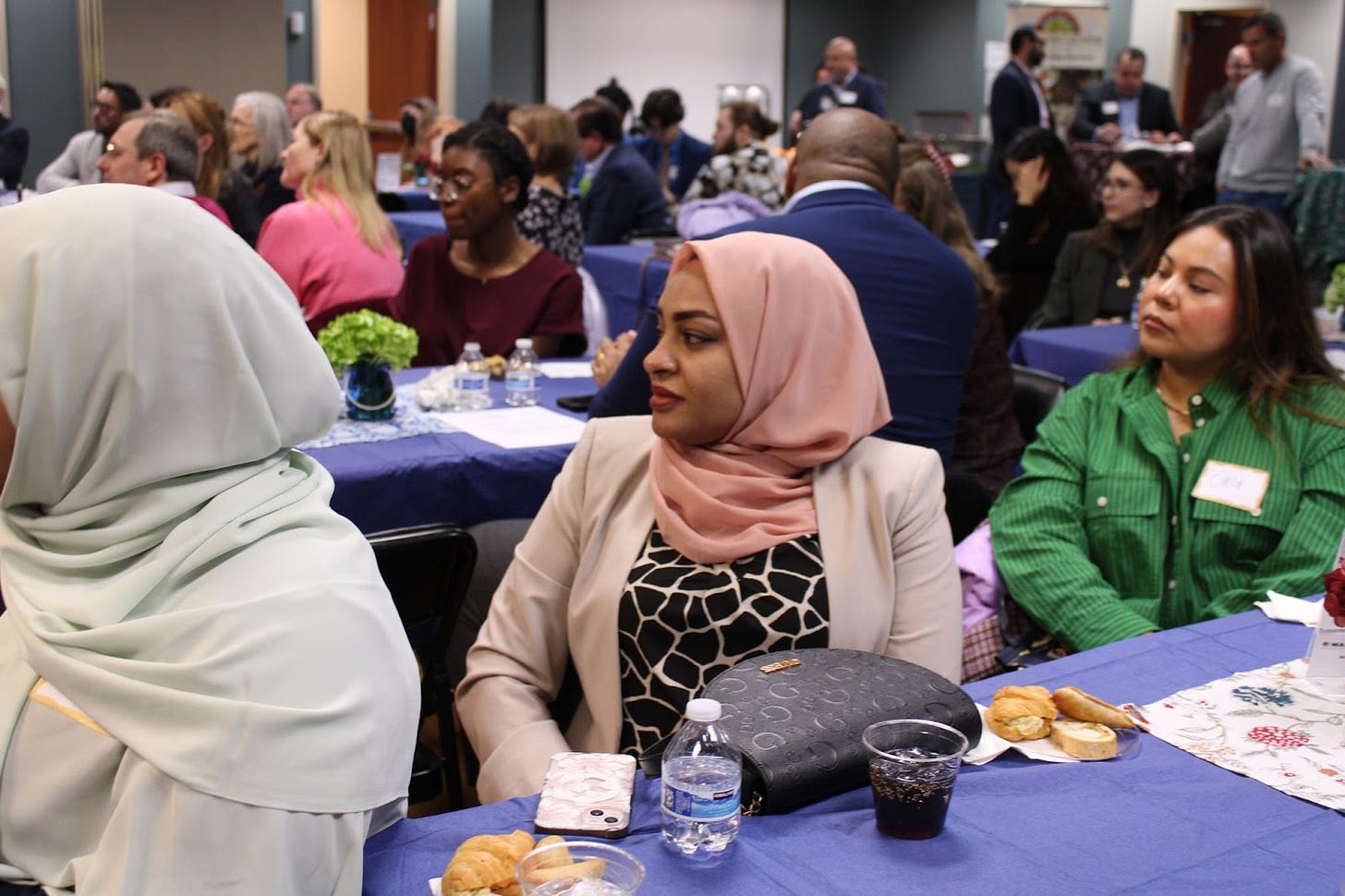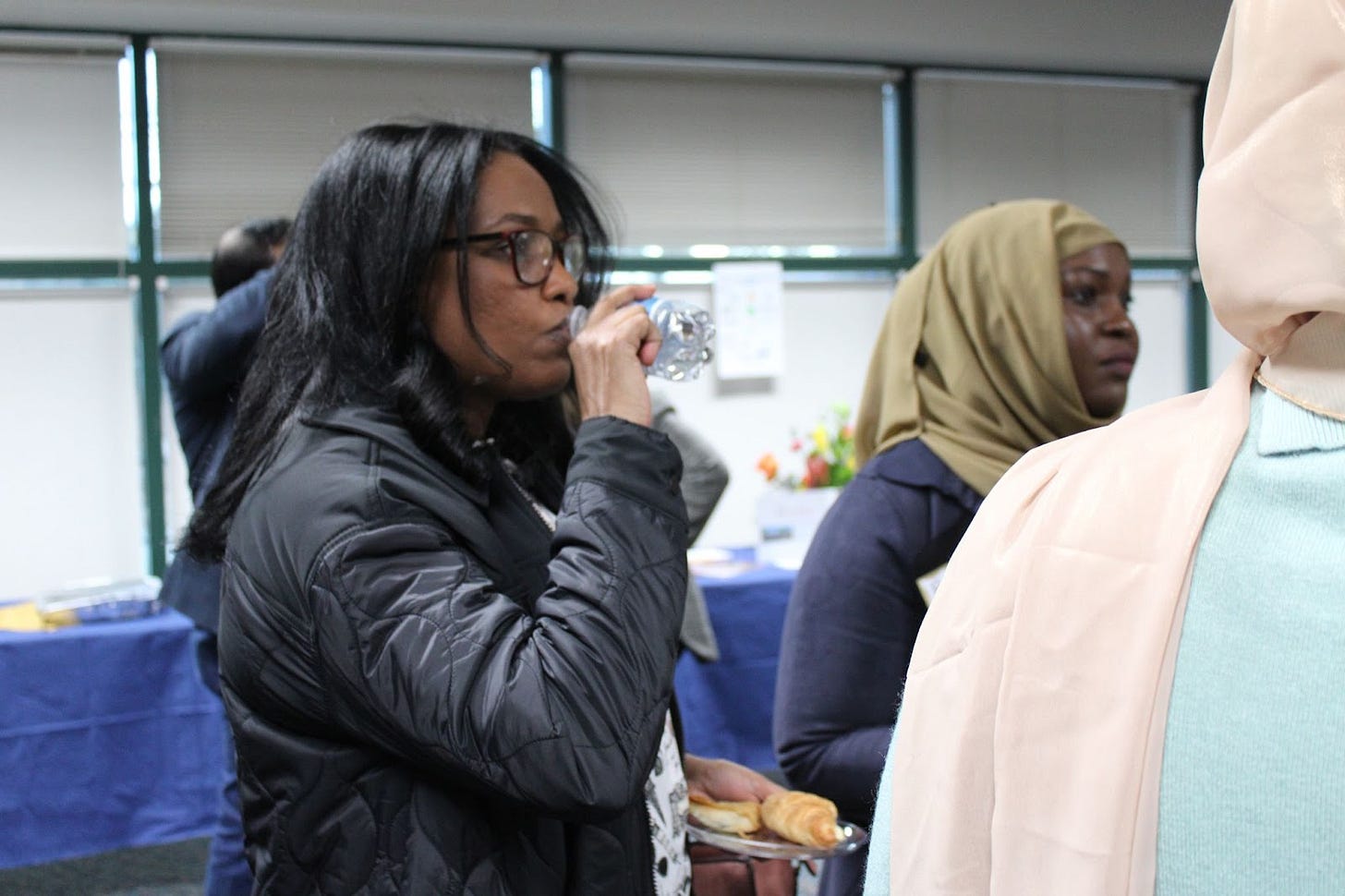Georgia’s conundrum: an “emergency level” shortage of healthcare workers, and people who want to fill the gap, but can’t.
Nafisa Mustafa went to medical school in Sudan. She wishes she could be part of the solution to the healthcare "emergency," but unless state laws change, she won't be able to.

Nafisa Mustafa’s list of qualifications is long.
She’s a research coordinator at Emory University - where she organizes care for patients at a diabetes clinic in Clarkston that serves immigrants and refugees. When she’s not doing that, she works as a medical scribe at a nephrology office. Last year, she completed a Geriatric Research Fellowship at Michigan State University. And before that, she was a clinical assistant for three years in New York. Her last job before moving to Metro Atlanta was as an assistant physician, where she worked in both inpatient and outpatient settings, under the supervision of a doctor.
In 2023, Nafisa moved to McDonough, in Henry County, because she thought it would be good for her husband and their three school-aged kids. And she said it has turned out to be great for them.
But for her career? Not so much. “I didn't know there was no opportunity for me as an immigrant…I wasn't aware that Georgia is not international medical grad friendly.”
Nafisa is a doctor. She obtained an MD in 2013 after completing six years of medical school in Khartoum, Sudan, where she said the training was similar to the American system. “We did the same thing. The first three years are basic science, then rotations in hospitals.”
Ever since she moved to the U.S. in 2017, she has been trying to get into a residency program. Without completing residency, she can’t get a medical license, and effectively has no pathway to practicing medicine, unless she moves to another state with more options.
“I have applied for 200 programs, and spent $5000 on the applications,” she said. “Some of them have open houses and they say ‘yes, of course we accept international grads.’ But I apply and nobody gives me an interview.”
She is part of a growing and untapped workforce — over 30 percent of foreign born individuals (a population that has grown by 90 percent in the past 20 years) in the state have a college degree or higher. Many have experience working in healthcare, IT, and other skilled trades in their origin countries. But because of barriers around licensing, opportunities in Georgia are limited.
That’s despite a growing shortage of healthcare workers in the state that has reached “emergency” levels, according to a GA state health official. 1 in 3 people in Georgia live in an area without a primary care physician. A 2022 study by the Georgia Healthcare Workforce Commission projects that by 2035 there is a danger that the shortage of medical workers could grow even larger, partially due to the state’s population growing. As for healthcare as a whole, one recent study from Forbes ranked Georgia last in the country.
Several states, including Missouri, Tennessee, and Louisiana, have been addressing their own shortages by coming up with creative workarounds. Among them - an assistant physician program - which gives those with international medical degrees the opportunity to work under the supervision of a physician in underserved areas. Some states allow assistant physicians to work in these roles indefinitely, while in other states, they can eventually move forward on the path to becoming a fully licensed doctor.
Dr. Gulshan Harjee, founder of the Clarkston Community Health Center, has been fighting to establish an assistant physician program in Georgia for over a decade. But, she says, “we have not made true progress at the legislation level.”
There is an acute awareness of the shortages though in the State Capitol. The Senate Study Committee on Expanding Georgia’s Workforce released a report last year which recommended improving access to English language programs and removing “barriers to admission at Georgia’s public colleges and universities by recognizing credentials earned abroad.” And, the Senate Occupational Licensing Study Subcommittee examined the issue of licensing last year, though its final report did not mention international medical graduates.
285 South reached out to both subcommittees for comment and information on plans for this legislative session, but at the time of publication, neither had responded to a request for comment.
Part of the resistance to an assistant physician program, according to reports, comes from the Medical Association of Georgia (MAG), an advocacy group for physicians that has over 8,000 members. Some members have been concerned that such program could negatively impact physicians, according to a 2018 report.
285 South contacted MAG, but the group has not responded to a request for comment.
“Too many times we look at these issues, any issue, from a place of fear,” said Shane Jackson, President of Jackson Healthcare, a national healthcare staffing company headquartered in Alpharetta. He was speaking at an event hosted by The Business and Immigration for Georgia (BIG) Partnership last Thursday. BIG, a coalition of business and civic leaders, has been working to build bipartisan support for expanding work opportunities for Georgia’s foreign born residents since 2020.
“There is so much of a challenge…so much of a looming problem that's going to get greater around our ability to provide healthcare for people, that we need to welcome all who can come in with any kind of solution towards this,” Shane told a roomful of community leaders, elected officials, and international medical grads who had gathered at the Latin American Association on Buford Highway to discuss the shortage of healthcare workers.
Secretary of State Brad Raffsenperger also joined on Thursday, and spoke about the state’s overall labor shortage. “We need good talent, we need to find jobs for folks, because I know what they want to do. They want to work,” he said.
Naeimah Eltaher went to medical school in Sudan too, and found out about BIG from Nafisa. She worked for several years as a family physician in Saudi Arabia, before moving here.
Naeimah was at the event, hoping to meet people who could help her find a job. As an older doctor, Naeimah says she needs work experience to make her a more attractive residency candidate.
But to find work, she needs connections. Which isn’t easy, because she’s new to Georgia, and doesn’t have established networks in the healthcare industry. She says she has applied to hospitals here and in North Carolina for entry level positions or even just observerships, but hasn’t heard back from anyone. “When you apply or ask some people…they don’t give you the chance right away.”
Nafisa, on the other hand, has been able to secure an entry level medical position. She said other Sudanese doctors she knows are stuck working at gas stations or are just sitting at home.
“They’re very depressed. In the eyes of your family you’re a doctor. They can't understand the system here.”





What about PA school? Could they apply and get scholarships? We need to explore this. Many international medical grads outperform our own students because they have finely honed clinical skills. They practice medicine where there was no CAT scan that you could order at a moments notice. So they really know how to get a good history and diagnose things that we in the United States could never do.